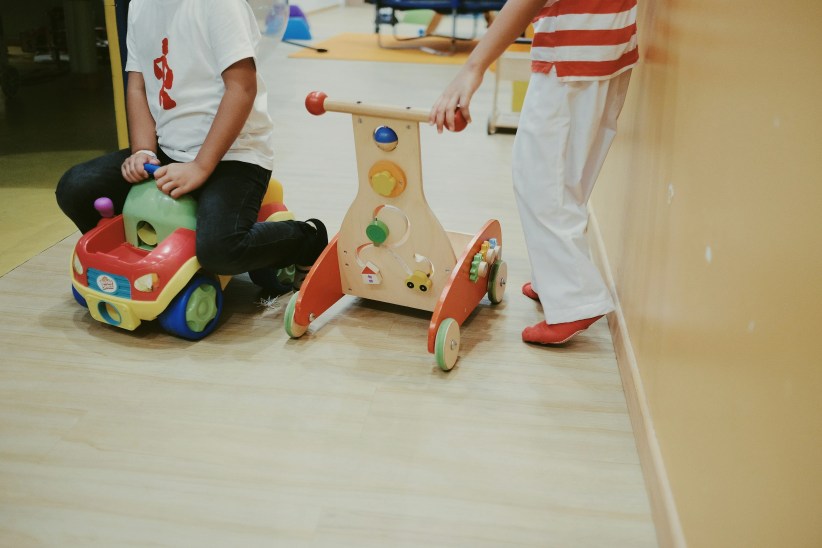Moms have a lot on their minds, and they’re thinking about much more than their mounting to-do lists. As a recent cover story in New York magazine highlighted, even a casual sweep through the bulletin boards of a site like urbanbaby.com is likely to reveal postings that are as deep as a personal diary. One recent soliloquy by an affluent mother of two spoke revealingly of her boredom and loneliness. Another mom was still in the after-shock of realizing that her husband was having an affair.
The Internet can be an oasis of support for mothers—especially when they come upon a sympathetic voice who really does seems to know what she is talking about. We know someone like that. She is Dr. Harriet Lerner, whose wisdom, as distilled in bestselling books like “The Dance of Anger” and “The Dance of Intimacy,” has been appreciated by millions of women over the past 25 years—though she may not be as well known among new moms. Given the surfeit of highly personal Internet sites (and articles about them), this seemed like a good time to check in with Harriet Lerner about the emotional experience of motherhood.
When a couple has their first child, they expect their relationship to change in certain ways—namely, that it will bring them closer. Yet, you point out that having a baby is one of life’s biggest stressors.
Before you have children you can have this fantasy about yourself that you’re a very nice person and that you’re going to sail through the phases of their development or clarity or calm like a saint. There’s nothing more stressful than the addition or subtraction of family members. I think people understand intuitively the subtraction part. If you lose people or someone dies, if there’s a divorce, we know that’s stressful. But the addition of family members, whether it’s through marriage or the birth of a child, is incredibly stressful. When the first child comes along, when two people amazingly become three, everything changes. Every relationship will change and have to be renegotiated and it’s made all the more difficult because there’s no manual.
How did you find the transition to being a new mom?
We don’t have a clue what our children will evoke in us until after we have them. Before I had children I was amazed at the improper behavior of the mothers I observed and I knew that I would never do any of these improper things. I wouldn’t yell at my kids, or I wouldn’t fight with Steve, my husband, in front of them. Of course I would set consistent rules and consequences. And most important I wasn’t going to be a worrier like my mother. And of course I did all of these things and more.
%uFFFD
Moms feel a lot of angst when it comes to deciding whether to stay at home with their kids or go back to work. What’s the best way to handle this dilemma?
It’s something that gets renegotiated and should be renegotiated at every stage of motherhood. The good news is that nothing is written in stone. The mother may, while pregnant, work very hard to negotiate a fifty-fifty arrangement. Later she may then want to be 90 percent with the baby, and surprise herself and really want to stay home. And after a while she might feel bored and frustrated and want to make a change. What’s important is that mothers understand the need to rethink things and to renegotiate who does what with their partner. And of course that’s very, very difficult in a society which expects too much from mothers and not enough from fathers.
Speaking of not expecting enough from fathers, women experience a lot of anger over the division of housework. The bulk of it inevitably falls to them, whether they’re home more than their partners or not. Is this something that should be negotiated at the beginning of a relationship?
I advise that people think about it but they also understand that it’s a challenge. The gender roles are very, very deep. I see many a couple in therapy who are totally committed to equality and to shared parenting, and they do just great until the first baby comes along. Despite feminism and despite new economic times, it’s a very deep assumption that the man’s career—and he usually earns more—can’t be tampered with.
It’s more of an issue with society than an individual couple?
It’s felt as a deeply personal problem but it’s not. Couples come to my office and she blames her and he blames him, but 90 percent of the difficulty is really outside of the couple and it’s in the workplace, which does not support both parents being able to earn an income and spend time at home and with each other when their children are young. So it gets played out with fighting, and of course there are individual issues. But it’s really a societal problem and what happens is that the women feel overwhelmed and angry and guilty about not getting it right, as if each individual woman should be able to solve the problem with the acquisition of a brighter attitude and new organizational skills and renegotiating with her husband.
It’s still seen as an extra bonus for fathers to be involved with childcare.
When my kid was born and Steve and I were both working in the Menninger clinic and there were all kinds of guilt inducing “mother stay home” messages coming my way. And I remember one time he wasn’t at a staff meeting and someone asked where he was. I said he was taking care of Matthew and they said, “Oh, he’s babysitting, what a guy!” I said, “No he’s not babysitting, he’s taking care of the kids.”
When kids enter the picture, it seems some couples’ sex lives comes to a halt. Is this normal?
If you’re talking about mothers with very little children, everything needs to be renegotiated. It’s very common that intimacy and sex go out the window. And endless conversations about it are not useful. What’s useful is to lighten up about it because it’s normal and to get a babysitter so that you go out and have some alone time with your adult partner, and not with a whole lot of pressure, not like, “Oh my god, we got the sitter and now we have to go out and be intimate.” Just understand that intimacy is going to be difficult for a while, but you need to respect each other, and warm each other’s hearts and get out. It is amazing how many couples I see are forever talking about, “She doesn’t want sex and he won’t do this,” and in the meantime they’re just not going out to a restaurant and the movies.
Many mothers talk about how, in the process of raising kids, they lose their sense of self. It doesn’t help that society judges moms by the kinds of children they have.
The responsibility that mothers feel for all family problems. Mothers are judged more than fathers. And they’re not only judged by their own behavior, they’re judged by their child’s behavior, which we can influence, but not control. So if your child is a polite tidy little citizen who cleans his room and gets good grades, people are going to say, “Mom you did a great job.” And if their child has tantrums, is defiant, and loses control, then someone may point a finger in mother’s direction. One of the things I remind mothers about is how little control we actually have.
Yet mothers can’t just throw up their hands when it comes to parenting.
This is not a message to give up on your kids. We have to work on our own selves. Parents have to work to change and control their own behavior. But we don’t control the outcome. Kids come into the world with their own unique strands of DNA, and some children are more difficult than others. I mean some kids are genuinely easy kids, and some kids are a piece of work. And again I’m not saying mothers are not important. In fact if you have a high maintenance child or a difficult child you need more help to get a grip on your own intensity to calm down, and to get creative about helping your child to pay attention and learn. But that doesn’t mean you caused the problem or can fix the problem. I want to be very clear that children are not little mirrors reflecting back the good or bad job we’ve done, because you’re always going to get that message.
Why are mothers racked with so much guilt when it comes to raising kids?
It has always been the case that guilt has been woven into the fabric of motherhood. Guilt and shame and feelings of inadequacy. That is very much a women’s problem. This excessive sense of responsibility and this myth that mothers can control who our children become. I mean there’s good guilt and bad guilt. Good guilt is very important for both parents. Good guilt is an essential human emotion that inspires us to keep our behavior congruent with our core values and beliefs. When our behavior is not congruent with our deeply held values and beliefs, guilt can inspire us to change our behavior and offer a genuine apology to our child. And this is a great gift. A mother can say I’m sorry I didn’t listen better, I’m sorry I acted like a know-it-all. But the guilt that society evokes in mothers is different. Mothers feel guilty for everything. They feel guilty for leaving their work for their children and guilty for leaving their children for work and they feel guilty about feeling guilty and guilty about not feeling guilty.
Is feeling guilty just part of being a mom?
I don’t think we can take that attitude. Society would prefer to have guilty women than angry women. People are more comfortable with women who are guilty because they can’t meet the criteria of the good mother. That’s more comfortable for the people around us than women who are angry. Because they’re questioning the job description.
Can you talk about the importance of a mother’s relationships with other adults in her life?
When we think about what’s a good mother, people tend to think in terms of the mother and child, but the relationship between the two parents is terribly important. The ability to not get kids caught up in the middle of parental intensity, the ability to work on the relationship with the kid’s father, whether you’re married or divorced, and to work on your relationships with the other adults in your life—your mother, your family of origin—is one of the best gifts you can give your kids.
Friendships between moms are often complicated and competitive. Yet they can also be fulfilling. Isn’t it important to have other moms to talk to?
When you become a mother, even more than you need expert advice you need friends who will tell you the truth about their vulnerability, their limitations, and their bad mother days. I think that mothers really hunger to hear the truth about the good, the bad and the unspeakable, and they really need to because society sets impossible standards for motherhood which we internalize. Society polarizes mothers, dividing them into the category of good mothers and bad mothers, so that women will talk about are they a good mother or bad mother? And these two categories belie the fact that if observed over time, most of us can be both very good and very bad.
When it comes to raising their children, you advise new mothers to ultimately listen to their hearts.
Avoid any expert or book that makes you feel more guilty. Women feel guilty enough and should not pay money to be made to feel more guilty. When I had my boys I had them in a more conservative climate. The books that I read, particularly about the first couple of years of life, made me totally miserable. So I think that mothers have too many experts out there telling them what to do. And the challenge is to keep an open mind, take advice when you need it, take what fits for you, and ignore the rest.
What final piece of advice do you have for married moms?
Avoid perfectionism like the plague. Perfectionism, especially your own perfectionism, is the arch enemy of mothers everywhere. It’s impossible just to barely self-consciously be ambulatory and breathing and get through the day. It’s quite enough.






















